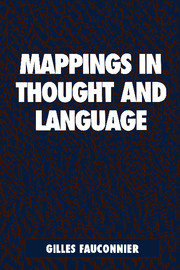3 - Tense and Mood
Published online by Cambridge University Press: 05 June 2012
Summary
We have seen how human thought, as it unfolds, sets up elaborate configurations of mental spaces linked to each other and to background knowledge. Discourse management is essential (Takubo 1993; Takubo and Kinsui 1992; Kinsui and Takubo 1990). The thinker, speaker, hearer, discourse participant must keep track of the spaces set up, their content, the links between them, and the order in which they appear. The process is a dynamic one. At any stage, one must know, or be able to figure out, how to move discursively through the configuration. Specifically, this means knowing at a given stage what space is the Base, what space is currently the Viewpoint, from which others will be accessed or constructed, and what space is in Focus—where meaning is currently being constructed. Two dimensions of human thought and human experience seem especially important in this regard: time and epistemic distance. All languages devote considerable grammatical resources to these two dimensions, and they are characterized in relative rather than absolute terms. Although the cognitive systems that reflect these two dimensions are invariably complex, the guiding ideas are simple. In moving (mentally) from one mental space to another, we try to keep track of the time shifts and epistemic shifts between the spaces in focus. Relative time is simply a relation between times of events in the two spaces. Epistemic distance is the “reality” status of one space with respect to another. Take, for example, the very short story Max is happy.
- Type
- Chapter
- Information
- Mappings in Thought and Language , pp. 72 - 98Publisher: Cambridge University PressPrint publication year: 1997

